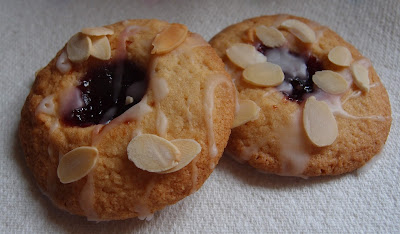I
had virtually no time to bake this weekend but, nonetheless, wanted some home
baking. This is the perfect recipe to have up your sleeve – the work of
minutes to get in the oven, very few ingredients, and utterly delicious.
If I had to pick my favourite things to pair with chocolate coconut would be right at the top of the list, perhaps having to slug it out with pear for who actually had the top spot. There is just something about coconut that brings out the best in chocolate and vice versa. I love the damp grainy texture of baked desiccated coconut and that you can find bits of it in your teeth for a while after eating – it’s the ingredient that keeps on giving!
One thing I think it’s important to point out – this recipe didn’t behave like a normal brownie recipe; usually, when you’ve done the melting of the chocolate and butter you end up with quite a liquid mixture right until you add the flour, and even then it’s a runny mix. This was thicker and only started to loosen when I added the eggs – here’s what it looked like after the initial melting stage (just so you don’t panic that it’s gone wrong if yours looks similar!):
Possibly the only difficult thing about baking brownies is judging when to remove them from the oven. I work on the assumption that things firm up/set/dry out a little on cooling so try and take them out before they look ‘done’. This goes against my prudent nature and I feel a bit of a risk-taking daredevil in removing something from the oven before it looks ready, but I force myself, and the momentary stress is worth it! In my opinion a brownie is better a little underdone, than a little over.
Ingredients
100g
cocoa powder
250g unsalted butter
500g golden caster sugar
4 eggs
100g self raising flour
100g desiccated coconut, plus 2 tablespoons extra to sprinkle on top
250g unsalted butter
500g golden caster sugar
4 eggs
100g self raising flour
100g desiccated coconut, plus 2 tablespoons extra to sprinkle on top
Method
Preheat
the oven to 180C/fan oven 160C/350F/gas mark 4.
Line
a 20cm square tin with baking paper or non stick foil.
Place
the cocoa powder, butter and sugar into a large pan (large enough to
accommodate all the additional ingredients) and melt over a gentle heat,
stirring all the time so nothing catches on the bottom of the pan.
When
everything has combined remove from the heat and leave to cool for about 10
minutes.
Beat
in the eggs, one at a time.
Fold
in the flour and coconut.
Pour
into the prepared tin and sprinkle the extra coconut over the top.
Bake
for approximately 45 minutes or until the brownie is set but not firm.
Best to start checking after about 30 minutes as ovens vary. If the top
is getting too dark and crusty, cover loosely with foil and continue to bake.
Leave
to cool in the tin and, when cool, cut into chunky sized squares.
Serve
with a cup of tea, or warm and serve with ice cream for dessert.
Bask
in the glory of the wonderful thing you have created.
Eat.


















